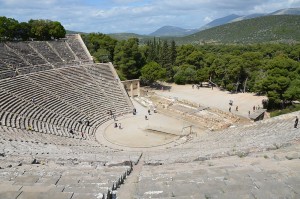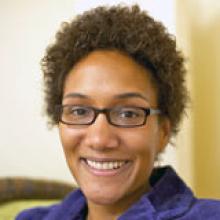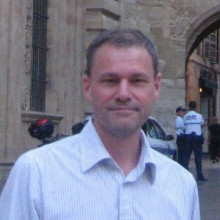Ancient Greece, Complex Histories
Lead Professors: Emily Greenwood and Kirk Freudenburg
EverScholar Residential Seminar in Greece:
Nafplio and Athens
August 1-12, 2021
Course has completed.
This course represents something wonderfully new: the EverScholar model of an intensive, seminar-based, deeply intellectual inquiry into the very epitome of a timeless subject, led by world-class faculty, with extensive advance preparation by a group of curious active learners, held in the very site of the events, culture, and people who gave rise to the object of our study. The ancient and later incarnations of Greece is the perfect subject for this immersive, on-location study. Many have traveled to Greece to simply tour; you now have the opportunity to learn, to see, to understand, and to experience the culture with these leading scholars and new friends.
Program Introduction
In the West, we have inherited multiple, intertwining histories of Greece, from knowledge of famous Greek battles, or Greek political institutions, to the classical references that are woven into the architecture of modern cities and references in our literature and politics. Ancient Greece, Complex Histories takes the complex, overdetermined framing of Greek history as its point of departure. This is so much more than a simple, conventional course in Greek history. Instead, it is an immersive, research-led seminar course that relates the study of primary and secondary sources for ancient Greek history to larger interpretative debates about how to do Greek history and the cultural politics of this history. Alongside staple authors for the study of Greek history, Herodotus and Thucydides, and sources from Greek epic (Homer, Hesiod) and drama (Aeschylus, Sophocles, Euripides, Aristophanes), we will read lesser studied authors (such as Aineias Tacticus), and we will work with the full gamut of material culture from masonry to highly wrought artistic objects. As we explain in the following paragraphs, the course will also have a strong meta-critical element.
The study of Greek history is currently experiencing a turn to macrohistories of the ancient Mediterranean, which emphasize the rich ecology within which ancient Greek cities emerged and existed, and their links with other parts of the world. For the purposes of our course, the first five days in the Peloponnese will give us an opportunity to consider geological and environmental factors in Greek history, from water supply to transport links by sea and land. We will also think about the precariousness and vulnerabilities of ancient Greek cities and the attempts that cities made to preserve aspects of their culture in historical memory. In ancient Greek religion, the divine was also part of this ecology and when we study some of the famous megalithic ritual sites we will consider how the Gods were built into the landscape and what this took, from the quarries from which the marble was taken, to the population of itinerant craftsmen involved in the religious architecture and art of ancient Greek sanctuaries and cities.
The sites that we will be visiting have been tourist sites, on and off, since classical antiquity, as epitomized by the Guide to Greece written by Pausanias in the second century CE. As such, they are rich palimpsests, in which fragments of travel writing and visual art have helped to shape the way in which these sites appear in the popular imagination. We will use our own travels in Greece to reflect critically on the history of travel writing and how this genre has contributed to an imaginary Greece. As Artemis Leontis has observed in Topographies of Hellenism (1995), the tradition of modern European travelers to Greece, with their letters, diaries, sketches and watercolors, helped to create the idea of Greece as the locus of classicism – an idea that makes it harder to uncover the actual history of Greece.
One of the intellectual imperatives for a course on ancient Greece history in Greece is to recognize that the history of Greece that we learn is filtered through different national traditions. This history is predominantly influenced by Northern European Philhellenism in Germany, Britain, and France in the late eighteenth and the nineteenth century, which in turn influenced North American conceptions of Greek history. Parallel to and predating these traditions, the Greek history of ancient Greece provides an example of a modern nation state that has been overshadowed by its homonymous ancient double throughout its history. As we have seen in the Eurozone crisis, the different proprietary claims that the rest of Europe makes on Greek antiquity continue to shape the fortunes of the modern state. With the construction of the New Acropolis Museum in Athens, which opened to the public in 2009, the Greek government has renewed claims for the repatriation of Greek antiquities, most notably the Parthenon marbles in the British Museum. The readings for the course will encompass works of critical museum and heritage studies that elucidate the economics, politics, and cultural anthropological dimensions of the archaeology of Greece – what the scholar Yannis Hamilakis has referred to as the “archaeopolitics” of Greece.
The course will incorporate daily visits to an incredible variety of important sites, closely coordinated with our seminar study and guided by our faculty and expert guides. Detailed information is available in the course brochure.
Our Lead Faculty
Syllabus and Structure of the Course
The course comprises a flipped-seminar format. For the first five days in Greece, we will have two 90-minute seminars each morning at the Center for Hellenic Studies (CHS) in Nafplio, with site visits, including on-site instruction and discussion taking place in the afternoons. In Athens, discussions will mostly take place at archaeological sites and in museums, but we will meet in a formal seminar setting at the end of each working day to review the sites and museums that we have visited and the questions that they raise.
In the seven months preceding the course (January-July 2021), seminar participants are expected to complete the required reading in the syllabus (more details in “Readings” section below). Topics will be approached through the readings, and we will read and discuss specific passages / works of art / monuments in close detail. These readings will then be further clarified and complicated when we visit sites.
Much more detail on these and other aspects of the program are available through our detailed brochure.
Readings
All EverScholar courses actually start months before our meeting. All books and other materials are included with the course. Upon registration, you will receive several preparatory books in short order; the course packet with scholarly articles and other materials curated by our faculty will follow in early 2021. Primary sources will mix with authoritative texts to produce night after night of joy as you prepare for your return to the life of the mind.
Special Events
One of EverScholar’s unique and most beloved features are our Special Events; sessions at a number of well-known (such as a museum or Art Gallery) or less-known centers of collection and learning. “Ancient Greece, Complex Histories” takes this to a new level, as during our first week our morning seminars will be followed by an afternoon visit to some of the wide range of significant places described in the course brochure. We will have not only elite guides, but of course our peerless faculty will join us. Discussions will take place in and near these transcendent environments; the insight and memories can only be dreamed of now.
Evenings will also include cultural and other events that will enhance our study.
Our Learning Locations
Our first week, we will be hosted by the Center for Hellenic Studies (CHS) in Nafplio, a gorgeous and significant town in the Peloponnese and the former capital of the First Hellenic Republic. CHS is a wonderful facility run by Harvard University, and we are honored that they have chosen to welcome us as an academically significant program. We will hold our morning seminars at CHS, and Nafplio is a perfect jumping-off point for our afternoon voyages.
We will then journey back to Athens where the latter portion of our program will take place, in reversed format – site and museum visits first, then seminars later in the day.
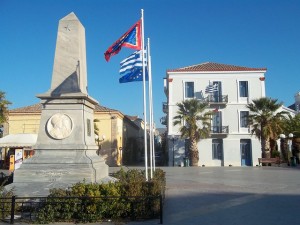
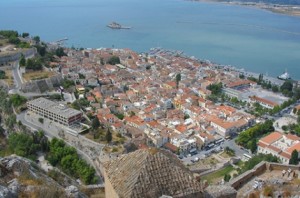
The course begins with a reception and dinner on Sunday, August 1 after a bus ride from Athens to Nafplio…. and ends when we return from Athens on Thursday, August 12. We will stay at luxury hotels in Nafplio and Athens with the option for single or double rooms.
The program cost is $11,250 per person double occupancy without airfare. Single supplements are available. Deposit is $2,000 per person. Balance is due on March 31, 2021. We also invite you to bring a companion/guest; details and costs for this are described in the full course brochure. Cancellation refund and COVID-19 refund policies are detailed on the registration page and in the course brochure – so you can register without worries. Looking forward to seeing you there!
